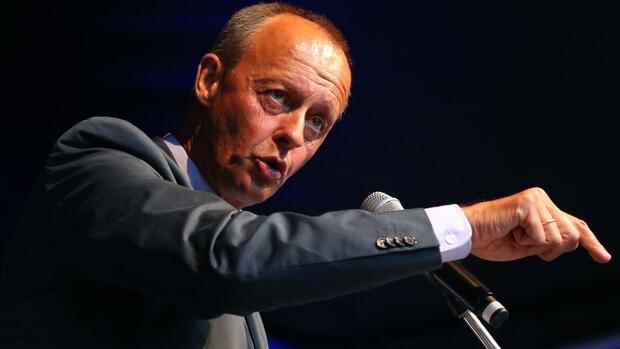Friedrich Merz announces: From Monday he is officially CDU chairman and is restructuring the party.
(Photo: imago images/Rene Traut)
Berlin When the CDU announces the official election results this Monday, Friedrich Merz will not be moved to tears again, like he was at the digital party conference a week ago. The tenth chairman in the history of the party, who initially won almost two-thirds of the members in a member survey in mid-December and who was then confirmed by the delegates with a good 95 percent, sees the day at best as the official starting signal for his self-declared mission: the party back on a regulatory course and back into power.
Merz, a member of the party for 50 years, will appear in front of the employees of the Konrad-Adenauer-Haus on Tuesday and explain how he imagines modern party work in the opposition: campaign and attack.
The Sauerland, who compares himself to an “old man who knows the corners,” will replace staff and turn the departments upside down: his spokesman from the time as Vice President of the Economic Council of the CDU will be his personal spokesman. Markus Kerber, who was State Secretary under Horst Seehofer (CSU) in the Federal Ministry of the Interior, could become head of the strategy department. There was no confirmation of the personnel, but also no denial.
In the past few weeks, the 66-year-old has already made countless phone calls to expand his power. He met with the party associations live or via video conference and has expelled all those who view him critically.
Top jobs of the day
Find the best jobs now and
be notified by email.
He catapulted the chairwoman of the Women’s Union, Annette Widmann-Mauz, from the presidency. Like parts of the employee wing in the 2018 and 2021 elections, she was instrumental in ensuring that Merz lost to Annegret Kramp-Karrenbauer and Armin Laschet.
Merz disempowers critics via gangs
At the beginning of the year, Merz asked the Junge Union to nominate a young candidate for the party presidency. At the same time, he suggested the North Rhine-Westphalian Minister of Construction, Ina Scharrenbach. What initially looked like an accident ensured that there were more than one candidate for the presidency: Widmann-Mauz lost.
Merz also seems to want to ensure order in his sense in the employee wing. The long-time CDA chairman Karl Josef Laumann (64) wants to run again, although a generational change was planned.
His Vice Dennis Radtke, 42, had hopes. However, the MEP from the Ruhr area had loudly warned against the “Merz Ultras” and called for a new social policy. At the party congress, he also lost the election – to the federal executive board. Merz should have taken note of it with benevolence.
Laumann, however, has often negotiated compromises with the business wing in the person of the former head of the SME Union, Carsten Linnemann. He is now party vice and is to develop a new basic program.
Merz was just as squeamish this week with Ralph Brinkhaus, head of the CDU/CSU parliamentary group. The East Westphalian wanted to stand for election again at the end of April and believed that at least the CSU state group was behind him. But Merz has never made a secret of claiming the Berlin stage for himself.
Angela Merkel showed him how in 2002 when, as CDU leader, she snatched the chair of the parliamentary group from Merz. Frustrated, he left politics in 2009 and only returned to the Bundestag last year.
Merz had discussed his coup with Markus Söder, who has enough problems in his own country given the poor poll numbers and doesn’t need trouble in Berlin. Brinkhaus withdrew in resignation last Thursday. Merz stated soberly: “We are bundling the work in the party and parliamentary group.”
CSU boss Söder joins in
Merz also sorted the relationship with the CSU with Söder. Power games and arguments like 2021 would not be repeated with him. The CDU is the big sister, not the other way around. Söder has long since declared that 2021 will not be repeated. Both have agreed to exchange ideas on a weekly basis.
After all, time is short. Whether there will be a Merz departure will be decided in the state elections: at the end of March in Saarland, then in May in Schleswig-Holstein and North Rhine-Westphalia – all countries in which the CDU is currently the prime minister.
The next federal party conference is supposed to take place in September, in Bremen, to finally adopt new statutes. The CDU then wants to introduce a 50 percent women’s quorum and create the post of deputy general secretary. Merz also wants to herald the end of the election campaign in the north: for Lower Saxony, where the CDU is still a junior partner and would like to appoint the prime minister.
No wonder that the new party under Merz reacted quickly and harshly in the case of Max Otte and kicked him out of the party on the day of his candidacy for the office of Bundestag President under the AfD flag. “Unanimously and quickly and clearly,” the decision was made, as party vizine Silvia Breher, herself from Lower Saxony, explained.
More: “We need a fight – but not about personnel”: Team Merz is rehearsing the departure
